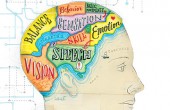Mental Health Recovery: Understanding Physical Symptoms
It seems unfair, to say the least, that when we are trying to recover from mental illness, our body can become ill as well. For a long time, I did not connect physical illness to mental illness. I believed the body and mind were separate.
I often found myself in my doctor's office. I told him I had migraines on a daily basis. He asked me if this had always been the case, and I told him no, just every few months. I get hit with serious sinus infections a few times a year, and curse my immune system. I am doing everything I should: eating healthy, exercising, taking my medication, and some vitamin's throw in for fun.
It took a long time to put the pieces together: mental illness causes unwanted physical symptoms, and not symptoms exclusively from psychiatric medication. I would walk into my psychiatrists office, sneezing and downing Advil for my migraine, until she finally told me that the sickness I experienced could be connected to my illness. Suffice it to say, I did a lot of research before I finally came around to the idea that, yes, mental illness is connected to physical health. Perhaps this is common knowledge to many people, but I was perplexed. How could a sinus infection be connected to bipolar disorder, and what could I do? I felt helpless and as if my body had a mind of its own.
Physical Illness Can Be a Warning Sign of Mental Illness
 Statistically, those who suffer with mental illness experience symptoms such as migraine, body aches, and flu like symptoms much more than those without a mental illness. These symptoms are usually not psychosomatic, a creation of a creative mind, but a sign that things might be a little off. Obvious symptoms like sleeping more and experiencing appetite change are red flags; but something like a migraine and general malaise, exhaustion, are harder to connect to mental illness. Learning to recognize physical symptoms, and connect them to mental health, is instrumental in recovery.
Statistically, those who suffer with mental illness experience symptoms such as migraine, body aches, and flu like symptoms much more than those without a mental illness. These symptoms are usually not psychosomatic, a creation of a creative mind, but a sign that things might be a little off. Obvious symptoms like sleeping more and experiencing appetite change are red flags; but something like a migraine and general malaise, exhaustion, are harder to connect to mental illness. Learning to recognize physical symptoms, and connect them to mental health, is instrumental in recovery.
Using Physical Symptoms to your Advantage
When I wake up with a migraine and cannot move, the word advantage is the last thing on my mind, but I take it into account. The brain has a curious, intelligent, way to alert us to our mental health. Think of your physical health as an indication of your mental health. All of us get sick, that's the human condition, but if symptoms seem to linger around, it's time to check in with your psychiatrist. Our physical health is as important as our mental health. Learning to connect the two, understanding that they work together to keep you well, can make recovery much easier.
Learning to Connect the Body to the Mind
 Yes, this might sound like some new-age, alternative approach to health, but it's crucial when maintaining or finding recovery. When your mind begins to falter, your body can warn you, and listening to it is important. A migraine can be a migraine, a flu just a flu, but when you have a mental illness it's important to pay attention to the duration of symptoms. Obsessing over your physical health can cause anxiety, but taking time to write down how you feel, physically and mentally, can increase awareness of your overall health.
Yes, this might sound like some new-age, alternative approach to health, but it's crucial when maintaining or finding recovery. When your mind begins to falter, your body can warn you, and listening to it is important. A migraine can be a migraine, a flu just a flu, but when you have a mental illness it's important to pay attention to the duration of symptoms. Obsessing over your physical health can cause anxiety, but taking time to write down how you feel, physically and mentally, can increase awareness of your overall health.
I have a tendency to be rather dramatic when I am ill: if I have a cold I am certain I have pneumonia, a flu and I fear I will soon perish. It's important, and I shall take this advice for myself, to not over analyze symptoms but to take them into account and use them to track any mood changes.
More often than not, a cold is just a cold and a migraine just a migraine, but staying on top of your physical health ensures better mental health.
APA Reference
Jeanne, N.
(2011, November 3). Mental Health Recovery: Understanding Physical Symptoms, HealthyPlace. Retrieved
on 2025, November 28 from https://www.healthyplace.com/blogs/recoveringfrommentalillness/2011/11/mental-health-recovery-understanding-physical-symptoms
Author: Natalie Jeanne Champagne
Psycho-somatic condition underlines unique health statement with perplex connection between physical and mental health. That's mean each somatic disease has got instant effect on mental health and vice versa; every mental disorder is reflected on physical condition. When it is in question depression as frequent and malingerer mood disorder the issue becomes more intrigued, dangerous and misunderstanding. In psychiatric practice there are numerous with delayed depressive disorder, whose mood disorder has been misdiagnosed as any other somatic illness. On the other hand there are many patient with concomitant depression through serious physical illnesses. Depression may be as reaction to any psycho-social stress event with false symptoms, such are headache, backache, nausea, vomits, sleepless, anorexia and so on. These and many others clinical characteristics of depression should be takes under account if any somatic patient has got resistant, longstanding and stubborn course of respective illness. In a word. comprehensive psychiatric treatment of depression should take in consideration, as soon as possible. Otherwise, we risk to face with dangerous complication of untreated depression such are suicide and serious physical illnesses.
Do you have support from your family or friends? Do you support yourself w/ R&R techniques and holistic supplements to relax nervous system?
Acute migraines are more painful than childbirth, so this bodily wear and tear is not to be taken lightly. It is NOT a matter of mind over headache, but positive vs. darkness.
Stress comes from all enviro elements...allergies,asthma,diabetes,heart,smoking,zero outdoor movement.
Meditation is a daily respite from stress. Practice a focus on one positive image for 10 min. Hold it. Don't let mind spin. Stop planning, forcing control. You can't fix migraines. They will fix themselves.
Cheers and lollypops to you!